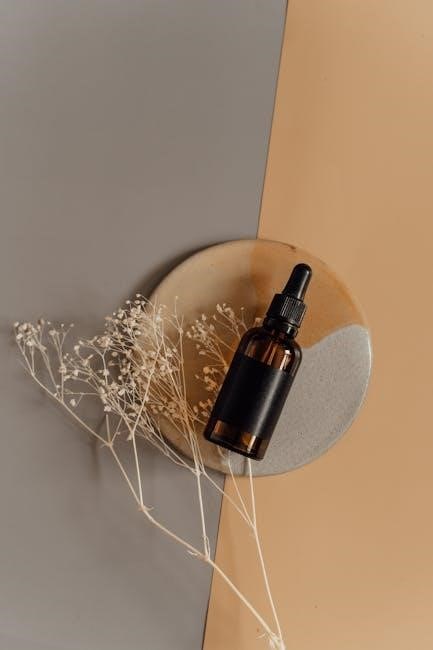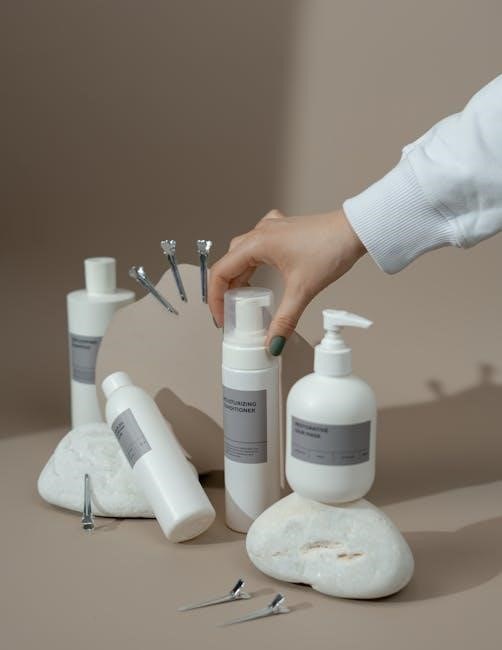
Modern skin health emphasizes holistic well-being, with evolving perceptions and expert insights driving personalized routines and nutrition-focused care for a natural glow daily.
1.1 The Evolution of Skin Care Awareness
Public perception of skin health has evolved significantly, shifting from basic cleansing to a comprehensive understanding of holistic care. Social standards and digital platforms have fueled interest in achieving flawless skin, with Google Trends showing increased searches for dermatological concerns. Experts now emphasize personalized routines, nutrition, and mental well-being, reflecting a broader awareness of skin as a mirror of overall health. This shift highlights the growing importance of educated, proactive approaches to skin care.
1.2 Understanding the Importance of Skin Health
Skin health is vital as it serves as the body’s first line of defense against external threats. Healthy skin promotes self-confidence and overall well-being. Factors like diet, hydration, and mental well-being significantly impact skin condition. Societal perceptions have shifted, valuing skin care as a reflection of health rather than just aesthetics. This proactive approach highlights the importance of understanding and maintaining skin health for long-term benefits and a glowing, radiant complexion.
Cleansing and Moisturizing: The Basics of Skin Care
Cleansing and moisturizing form the cornerstone of effective skin care. Dermatologists emphasize selecting products tailored to your skin type for optimal hydration and balance, ensuring a consistent routine.
2.1 How to Choose the Right Cleanser for Your Skin Type
Choosing the right cleanser involves identifying your skin type—normal, dry, oily, or combination. Dermatologists recommend selecting gentle, non-comedogenic formulations for oily skin, while dry skin benefits from hydrating, creamy cleansers. Combination skin may require balancing products. Avoid harsh ingredients that strip natural oils, opting instead for cleansers with soothing properties like ceramides or hyaluronic acid to maintain skin balance and hydration without irritation.
2.2 The Role of Moisturizers in Maintaining Skin Hydration
Moisturizers are essential for maintaining skin hydration by repairing the skin barrier and locking in moisture. They help balance water levels, reducing dryness and enhancing elasticity. For oily skin, lightweight, oil-free formulations are ideal, while dry skin benefits from rich, emollient moisturizers. Ingredients like hyaluronic acid and ceramides are key for long-lasting hydration, ensuring a soft, supple complexion regardless of skin type or concerns.
Sunscreen: A Critical Component of Skin Health
Sunscreen is vital for protecting against UV damage, preventing premature aging, and reducing cancer risks. It’s a cornerstone of daily skincare for healthy, protected skin.
3.1 Understanding SPF and Its Impact on Skin Protection
SPF (Sun Protection Factor) measures a sunscreen’s ability to protect against UVB rays, which cause sunburn. Higher SPF indicates greater protection, but no sunscreen offers complete blockage. SPF 30 filters about 97% of UVB rays, while SPF 50 filters around 98%. Broad-spectrum sunscreens also protect against UVA rays, which cause aging. Dermatologists recommend using broad-spectrum sunscreen with at least SPF 30 daily for optimal skin protection and cancer prevention.
3.2 How to Incorporate Sunscreen into Your Daily Routine
Incorporating sunscreen into your daily routine is essential for consistent skin protection. Apply a broad-spectrum sunscreen with at least SPF 30 15-30 minutes before sun exposure. Reapply every two hours, especially after swimming or sweating. Use it daily, regardless of weather, as UV rays penetrate clouds. Pair sunscreen with a hat and protective clothing for enhanced defense. Make it a habit to apply sunscreen as the final step in your morning skin care regimen.
Personalized Skin Care: Understanding Your Skin Type
Identifying your skin type—normal, dry, oily, or combination—is crucial for crafting a personalized routine that addresses specific concerns and maintains balance for optimal skin health.
4.1 Identifying Your Skin Type: Normal, Dry, Oily, or Combination
Identifying your skin type is essential for effective care. Normal skin is balanced, dry skin lacks moisture, oily skin produces excess oil, and combination skin is a mix. Experts suggest analyzing texture, tone, and behavior after cleansing to determine your type, ensuring tailored routines for specific needs and concerns, promoting healthier, more radiant skin over time.
4.2 Tailoring Your Skin Care Routine to Your Skin Concerns
A personalized approach is key to addressing specific skin concerns. Whether targeting acne, dryness, or sensitivity, understanding your skin’s unique needs allows for effective product selection. Dermatologists recommend adapting routines based on individual concerns, ensuring consistency and optimal results. A tailored regimen not only enhances skin health but also boosts confidence, promoting a glowing, resilient complexion over time;

The Impact of Diet and Hydration on Skin Health
A balanced diet rich in vitamins, antioxidants, and hydration is vital for maintaining healthy skin. Proper nutrition and water intake support skin elasticity, texture, and overall radiance effectively.
5.1 Nutritional Foods That Promote Healthy Skin
Nutrient-rich foods like berries, nuts, and leafy greens provide essential vitamins and antioxidants. Omega-3 fatty acids from fish and flaxseeds support skin elasticity, while vitamin C in citrus fruits boosts collagen production. Incorporating whole grains and lean proteins ensures a balanced intake, promoting a radiant complexion and reducing inflammation. A diet low in sugar and dairy can also prevent skin issues, fostering a healthier, more youthful appearance naturally.
5.2 The Role of Water in Maintaining Skin Elasticity and Texture
Hydration is vital for skin health, as water maintains elasticity and plumpness. Drinking enough water ensures proper skin texture and prevents dryness. Aim for at least 8 cups daily. Dehydration can lead to dull, tight skin. Staying hydrated supports skin repair and circulation, helping to combat signs of aging; Incorporate water-rich foods and herbal teas to enhance hydration levels for a radiant, healthy glow.
The Role of Sleep in Skin Health
Sleep is crucial for skin regeneration, repair, and overall health. During rest, skin cells regenerate, reducing signs of aging and improving texture for a refreshed appearance.
6.1 How Sleep Affects Skin Regeneration and Repair
Sleep is essential for skin regeneration and repair. During deep sleep, the body releases growth hormones that stimulate collagen production, reducing wrinkles and fine lines. The skin repairs itself from environmental stressors like pollution and UV exposure. Adequate rest helps reduce inflammation, preventing acne and other skin issues. This process is crucial for maintaining healthy, glowing skin and overall skin health.
6.2 Tips for Improving Sleep Quality for Better Skin
To enhance sleep quality for better skin, maintain a consistent sleep schedule and create a relaxing bedtime routine. Avoid screens before bed, as blue light disrupts melatonin production. Keep your bedroom cool and dark to promote deep sleep; Stay hydrated throughout the day but avoid excessive fluids before bed; A balanced diet rich in antioxidants and omega-3 fatty acids can also support better sleep and skin health.

Environmental Factors and Skin Health
Pollution, UV exposure, and humidity significantly impact skin health, causing premature aging, irritation, and oiliness. Protecting skin from these stressors is essential for maintaining its natural barrier and health.
7.1 The Effects of Pollution on Skin Health
Air pollution, including particulate matter, nitrogen dioxide, and volatile organic compounds, can cause oxidative stress and inflammation, leading to premature aging, dark spots, and irritation. Urban environments with high pollution levels often see increased cases of dull, uneven skin tones. Indoor pollutants, such as smoke and chemicals, also contribute to skin damage. Protecting the skin from these environmental stressors is crucial to maintaining its health and preventing long-term damage.
7.2 Protecting Your Skin from Environmental Stressors
To combat the effects of pollution, incorporate antioxidants into your routine to neutralize free radicals. Use broad-spectrum sunscreen daily to shield against UV rays and pollution-induced damage. Cleanse your skin thoroughly with products containing detoxifying agents to remove impurities. Moisturize to strengthen the skin barrier, and consider wearing protective makeup or masks in highly polluted areas. These practices help mitigate environmental stressors’ impact on your skin’s health and appearance.
Common Skin Concerns and Solutions
Addressing acne, dark spots, and hyperpigmentation requires tailored routines and medical treatments. For sensitive skin, gentle products and soothing agents are essential to maintain comfort and reduce irritation effectively.
8.1 Addressing Acne, Dark Spots, and Hyperpigmentation
Acne, dark spots, and hyperpigmentation are common concerns that can be managed with targeted treatments. Dermatologists recommend using products containing salicylic acid or benzoyl peroxide for acne, while vitamin C and retinoids help reduce pigmentation. Consistency in routines and protecting skin from UV exposure are crucial for preventing further damage and achieving even-toned, healthy skin over time.
8.2 Managing Sensitive Skin: Causes and Remedies
Sensitive skin often stems from environmental factors, genetic predisposition, or harsh products. Dermatologists recommend using hypoallergenic and fragrance-free products to minimize irritation. Gentle cleansing and moisturizing routines, avoiding over-exfoliation, and incorporating soothing ingredients like aloe vera or ceramides can help calm and protect the skin. Consistency in care and avoiding trigger irritants are key to managing sensitivity and maintaining a balanced, comfortable complexion.
The Role of Mental Health in Skin Health
Stress and emotional well-being significantly impact skin health, causing issues like acne and sensitivity. Mindfulness practices and stress management can promote healthier, clearer skin and overall well-being.
9.1 The Connection Between Stress and Skin Issues
Stress triggers hormonal changes, increasing cortisol levels, which can lead to skin issues like acne, eczema, and psoriasis. High stress also weakens the skin’s barrier function, making it more sensitive and prone to inflammation. Managing stress through mindfulness and relaxation techniques can help mitigate these effects, promoting healthier skin and overall well-being. Recognizing this connection is key to addressing skin concerns holistically.
9.2 Mindfulness Practices for Better Skin Health
Mindfulness practices, such as meditation and deep breathing, reduce stress and promote relaxation, which can improve skin health. These techniques lower cortisol levels, minimizing acne and inflammation. Regular mindfulness exercises enhance emotional well-being, contributing to a glowing complexion. Incorporating activities like yoga or journaling fosters self-awareness, helping individuals adopt healthier habits for their skin. Consistency in mindfulness can lead to clearer, more resilient skin over time.

Skincare Trends: What’s New and What Works
Modern skincare trends focus on natural ingredients, personalized routines, and scientific advancements. Products with antioxidants and hyaluronic acid are gaining popularity for their effectiveness in promoting healthy, glowing skin.
10.1 The Rise of Natural and Organic Skincare Products
The demand for natural and organic skincare products has surged, driven by consumer awareness of harmful chemicals. Products with antioxidants and hyaluronic acid are favored for their effectiveness in promoting healthy, glowing skin. This shift reflects a broader preference for sustainable and ethical beauty practices, aligning with modern lifestyle choices that prioritize wellness and environmental consciousness.
10.2 The Science Behind Emerging Skincare Ingredients
Emerging skincare ingredients like niacinamide and hyaluronic acid are gaining traction due to their scientifically-backed benefits. Research highlights their ability to improve skin texture, reduce inflammation, and enhance hydration. These advancements are supported by dermatological studies, ensuring efficacy and safety. Such innovations cater to diverse skin concerns, offering targeted solutions for acne, aging, and sensitivity, thereby revolutionizing modern skincare routines.

The Importance of Professional Guidance
Professional guidance from dermatologists ensures personalized skincare advice, addressing specific concerns effectively and safely, promoting long-term skin health through tailored recommendations and expert care.
11;1 When to Consult a Dermatologist
Consult a dermatologist for persistent skin concerns like acne, dark spots, or sensitivity. They provide expert advice, personalized treatments, and early detection of skin conditions, ensuring effective care.
11.2 How Dermatologists Can Help You Achieve Your Skin Goals
Dermatologists offer personalized advice and treatments tailored to your skin type and concerns. They provide expert care for conditions like acne, sensitivity, and hyperpigmentation, ensuring effective solutions for a healthier complexion and confidence.
Maintaining Consistency in Your Skin Care Routine
Consistency is key to achieving long-term skin health benefits, as regular routines help improve texture, reduce breakouts, and enhance hydration for a radiant, balanced complexion over time.
12.1 The Benefits of a Regular Skin Care Regimen
A consistent skin care routine is essential for maintaining healthy, glowing skin. Regular cleansing and moisturizing help balance skin pH, reduce breakouts, and improve texture. Over time, this regimen strengthens the skin’s barrier, enhancing its ability to retain hydration and protect against environmental stressors. A well-executed routine also boosts confidence and promotes long-term skin health, addressing specific concerns like acne or sensitivity with tailored care.
12.2 Tips for Staying Committed to Your Skin Health Journey
Consistency is key to achieving lasting skin health. Set realistic goals and track progress to stay motivated. Celebrate small milestones, like improved texture or reduced breakouts. Seek inspiration from dermatologist-recommended routines and automate your regimen with reminders. Remember, skin health is a journey, not a quick fix. Stay patient, and embrace the process as part of your self-care ritual for long-term results.
Achieving healthy skin is a holistic journey that requires consistency, patience, and self-care. By embracing personalized routines, expert guidance, and mindful practices, you can unlock radiant, resilient skin. Remember, skin health is a lifelong commitment, and every small step contributes to long-term results. Stay informed, adapt to your needs, and celebrate the progress toward a glowing, healthy complexion.